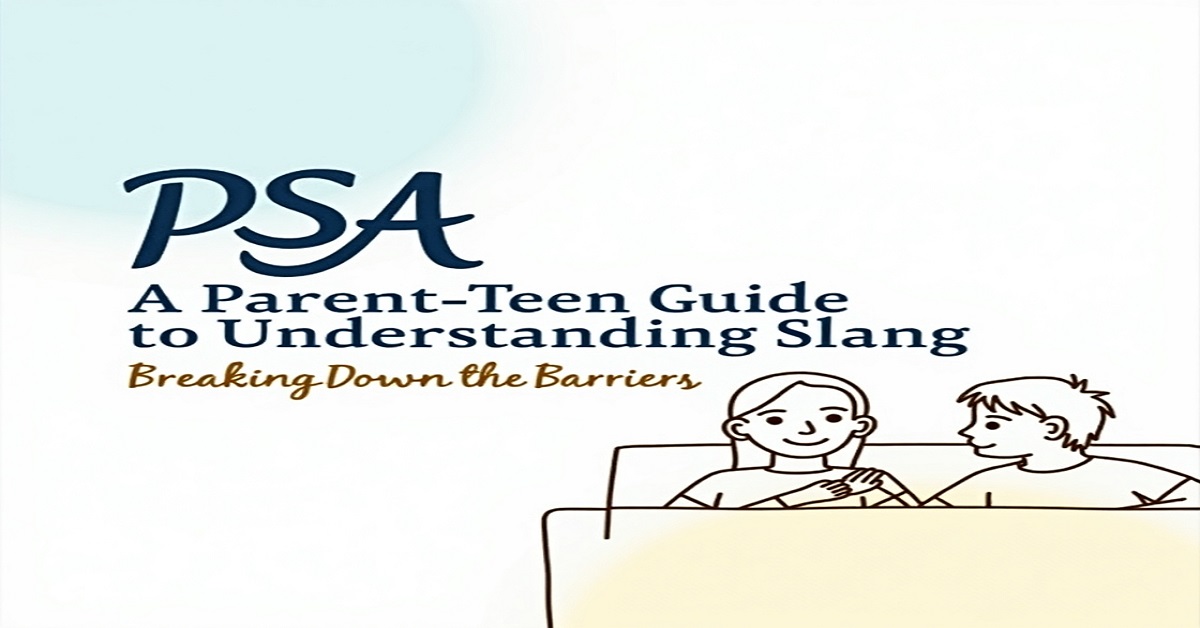If you’re a parent, you might find yourself occasionally scratching your head, wondering what your teen just said. “Bet,” “slaps,” “sus” – are they speaking English, or is this some secret code you missed out on? And if you’re a teen, well, maybe you’re just waiting for your parents to stop using “groovy” and “rad” so you can get on with your life. PSA: You’re not alone in this! Slang is evolving faster than the latest TikTok trend, and it’s time for all of us to get in on the action.
Whether you’re a parent trying to understand your teen’s cryptic texts or a teen trying to decode what your mom just said (spoiler: she’s probably not as cool as you), we’ve got you covered.
So, let’s break it down and decode this slang mystery with a little humor, a lot of patience, and maybe a dash of cringey mom jokes. Ready? Let’s dive into the world of slang, where every word seems to have a new twist.
Why Is Slang So Important, Anyway?
First off, let’s talk about why slang matters. Slang is like the informal, energetic cousin of language. It’s quick, it’s punchy, and it’s usually designed to be relatable. Think of it as language’s way of saying, “Hey, I know exactly how you feel, and I’m going to show you through a few words that hit home.” Teens use slang because it’s a shorthand that lets them connect with their peers in a way that feels, well, cool.
But for the rest of us—especially parents—keeping up with these fast-moving words can feel like trying to catch up to the latest viral dance challenge. It’s all fun and games until your kid calls you “slay,” and you’re left wondering if that’s a compliment or a weird insult. (Spoiler alert: it’s a compliment. You’re absolutely slaying.)
What Exactly is PSA in Teen Slang?
Alright, let’s tackle one of the most important acronyms in teen vocabulary today: PSA. Now, you might think it stands for something official, like “Public Service Announcement” (which, yes, it does—at least, traditionally). But in the teen slang world, a PSA is used a little differently. It’s a way of saying, “Hold up, everyone. This is important, pay attention!” It’s like the internet version of a bell ringing to get your attention, followed by something that’s either funny, serious, or downright surprising.
Example of a PSA in Action:
- Teen 1: “PSA: Don’t try to cook a frozen pizza while you’re also trying to finish your essay. It will burn.”
- Teen 2: “Thank you for the PSA, I almost did that.”
In this case, the teen is letting everyone know that cooking a pizza and doing homework at the same time is a terrible idea. The PSA serves as a quick tip or heads-up, usually in a humorous or relatable way.
How Does Slang Evolve So Quickly?
One day, you’re hearing your kid say something that makes sense, and the next, they’re dropping new slang you’ve never heard of. It’s like slang has a built-in expiration date, and if you don’t keep up, you risk sounding like your parents did when they tried to use “rad” in a sentence.
Slang evolves because it’s driven by pop culture, social media, and the need for teens to have their own space to communicate. TikTok, Twitter, and YouTube are breeding grounds for new words, and as soon as one catches on, it spreads like wildfire. If you can get your friends to laugh or agree with a new word, you’ve just launched it into the slang stratosphere.
But what makes slang so fun is that it’s constantly changing. One minute, everyone is saying “lit,” and the next, it’s “fire” (which, by the way, means awesome). So if you’re a parent, just know that the word your teen is using today might be outdated in a month. Don’t stress, you’ll have time to catch up.
Funny Examples of Slang in Real Life
Let’s make this a little more relatable. Here are some real-life scenarios where slang comes into play:
Example 1: The Teen and the Pizza
- Mom: “Why don’t you eat your vegetables? They’re good for you.”
- Teen: “No cap, I’m not eating that.”
- Mom: “What does ‘no cap’ mean?”
- Teen: “It means I’m not lying. I’m serious about not eating that broccoli.”
In this situation, “no cap” means no lie, or in other words, being totally honest. Slang words often replace long explanations with a single, snappy phrase.
Example 2: The Power of “Bet”
- Teen 1: “I bet you I can finish this homework in 10 minutes.”
- Teen 2: “Bet. I’ll time you.”
- Teen 1: “You’re on.”
Here, “bet” is like saying “okay” or “you’re on,” as in a challenge or agreement. It’s short, to the point, and somehow sounds way cooler than saying “okay, let’s do it.” Slang, am I right?
Example 3: The “Slaps” Situation
- Teen 1: “This new song slaps.”
- Parent: “What does that even mean?”
- Teen 1: “It’s fire, Mom. It’s really good. You wouldn’t understand.”
In this case, “slaps” means “is awesome” or “is really good.” And “fire”? That’s just another way of saying “amazing.” So if you hear a teen say a song slaps, it’s actually a good thing, even though it might sound like the opposite.
The Most Common Slang Terms You’ll Hear
Let’s go over some of the most popular slang terms that are making the rounds. Think of this as your official cheat sheet to teen talk.
- Bet – Used to show agreement or challenge someone.
- Example: “You think you can beat me in a race? Bet.”
- No Cap – Used to express honesty. It means “no lie.”
- Example: “That pizza was so good, no cap.”
- Slaps – Means something is really good or awesome.
- Example: “This movie slaps, you have to watch it.”
- Fire – Another way to say something is amazing or great.
- Example: “That outfit is fire.”
- Sus – Short for “suspicious.” It’s used when something feels off.
- Example: “That story is sus, I’m not buying it.”
- Flex – To show off or boast about something.
- Example: “She’s always flexing her new shoes.”
- Lowkey/Highkey – Lowkey means something subtle or not obvious, while highkey is the opposite, meaning something obvious or open.
- Example (Lowkey): “I lowkey want pizza for dinner.”
- Example (Highkey): “I highkey love this band.”
- Vibe – Refers to the atmosphere or feeling of something.
- Example: “This party has the best vibe.”
- FOMO – Fear of missing out. It’s the feeling you get when you think something exciting is happening without you.
- Example: “I can’t believe I’m missing the concert, I have major FOMO.”
When Parents Misuse Slang (It’s Okay, We Get It)
Let’s face it, when parents try to use slang, it’s kind of like watching someone trying to pull off a dance move they just learned from a YouTube tutorial. It’s adorable, but also slightly painful.
- Mom: “This dinner is lit, don’t you think?”
- Teen: “Mom… please don’t ever say that again.”
It’s okay, parents. We get it. Slang can be confusing. The key here is to have a little fun with it. You don’t have to use every new word your teen is saying, but if you try, you’re showing them that you’re trying to stay in the loop, and that counts for something.
Wrapping Up – Slang Isn’t Going Anywhere
Slang is here to stay, and if you’re a parent, you can either embrace it or let it keep mystifying you. Either way, understanding teen slang doesn’t have to be a daunting task. With a little effort (and a lot of humor), you’ll soon find yourself using “bet” and “slaps” like a pro. And who knows? Maybe one day you’ll drop a killer PSA about something important like how you can’t survive on coffee alone, and your teen will be impressed with your knowledge of modern lingo.
So, what do you think? Any slang terms that have you scratching your head? Drop your thoughts in the comments below and let’s keep this conversation going. After all, we’re all just trying to understand each other in this fast-paced, ever-changing world of slang!
FAQs About Teen Slang: A Parent’s Guide
1. What does “PSA” mean in teen slang?
In teen slang, “PSA” stands for “Public Service Announcement.” It’s used to share something important or noteworthy, often in a humorous or relatable way. It’s like saying, “Hey, listen up, this is important!”
2. Why is slang changing so quickly?
Slang evolves quickly because it’s influenced by pop culture, social media, and peer groups. Trends on platforms like TikTok and Twitter spread slang words faster than ever, and once something catches on, it becomes the new norm. Teens like to keep things fresh, and slang helps them carve out their own space to communicate.
3. What does “bet” mean?
“Bet” is a slang term that shows agreement or indicates a challenge. It’s like saying “okay” or “you’re on.” For example, if someone dares you to do something, you might say, “Bet” to agree or accept the challenge.
4. How can I keep up with all the slang my teen uses?
The best way to keep up with slang is to stay curious. Ask your teen what certain words mean when you don’t understand them. They’ll appreciate the effort, and you’ll learn something new. Also, don’t be afraid to Google terms or ask other parents for help. You’re not alone in this!
5. Is it okay for parents to use slang?
It’s definitely okay for parents to try using slang, but remember, it can sometimes come across as a bit cringey (in a funny way). If you use slang with humor and show that you’re trying to connect, your teen will likely appreciate it, even if it’s not perfect. Just be ready for some playful eye rolls.
6. What does “slaps” mean?
When something “slaps,” it means it’s really good or awesome. For example, if your teen loves a song, they might say, “This song slaps!” It’s just a cool way to say it’s great.
7. Why do teens use slang instead of regular words?
Teens use slang to feel like they’re part of an exclusive group, to express themselves quickly, and to have a little fun with language. It’s also a way to distinguish themselves from adults and create their own identity.
8. Can slang ever become outdated?
Yes! Slang has a shelf life. What’s popular today might be totally out of style tomorrow. But don’t worry, new words will pop up to replace the old ones. It’s just part of the linguistic cycle.
9. What does “no cap” mean?
“No cap” means no lie or being completely honest. If your teen says, “This movie is so good, no cap,” it means they’re genuinely telling the truth—it’s really that good.
10. Is there any slang I should avoid using as a parent?
The key is to avoid overdoing it or trying to sound too “young.” Using slang too frequently may make you sound forced or insincere. If you’re not sure, it’s best to keep it natural and use it in moderation.
11. How can I incorporate slang into conversations with my teen without sounding ridiculous?
Start small. Pick a few words you like (such as “bet” or “slaps”) and try using them in casual conversations. If you mix them into everyday chats, you’ll sound more authentic. And remember, it’s okay to laugh at yourself if you get it wrong—humor is key.
12. What is “sus” in slang?
“Sus” is short for “suspicious.” If something feels off or shady, teens might say it’s “sus.” For example, if someone tells an unbelievable story, your teen might say, “That sounds sus” to indicate they don’t trust it.
13. Why do teens make up new words for everything?
Teens create new slang words to express themselves in ways that feel fresh and unique. It’s part of the fun of language—creating new meanings for old words or inventing entirely new ones to reflect their experiences, culture, and emotions.
14. Can I use slang with other parents?
Sure! If you’re in a group with other parents who are familiar with the slang, feel free to share a few terms. It’s a great way to bond and stay connected with the trends. Just be aware that not all parents may be on the same slang wavelength, so gauge the situation before you drop a “bet” or a “slaps.”
15. What does “vibe” mean?
“Vibe” refers to the atmosphere, mood, or feeling of something. If you hear a teen say, “This party has a good vibe,” they’re saying that the energy or ambiance of the party is positive and fun.

Tony James is a passionate wordsmith and the creative force behind Winky Hive. With a knack for uncovering the stories behind slang and weaving emotions into poetry, Tony brings a unique voice to every piece he writes. A lifelong lover of language, he thrives on exploring how words evolve, connect, and inspire.
When he’s not penning articles or crafting verses, Tony enjoys diving into cultural trends, reading classic poetry, and discovering hidden gems in modern expressions. His mission? To make Winky Hive a haven for those who love the art of language in all its vibrant forms.









